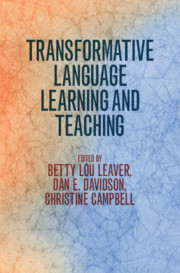Book contents
- Transformative Language Learning and Teaching
- Transformative Language Learning and Teaching
- Copyright page
- Contents
- Figures
- Tables
- Contributors
- Foreword
- Acknowledgments
- Abbreviations
- 1 Introduction
- Part I Theoretical Framework
- Part II Transformative Language Learning and Teaching Applications in Government Programs
- Part III Transformative Language Learning and Teaching Applications in University Programs
- Part IV Transformative Language Learning and Teaching Applications in Immersion Programs
- Part V The Learner
- 16 The Language Classroom as Transformative Response to the Unique Needs of Migrants and Refugees
- 17 Technology and Transformative Language Learning and Teaching
- 18 Transformation of Learners' Meaning-Making Repertoires through Classroom Instruction
- 19 Language Learner Autonomy and Transformative Classroom Practice
- 20 Cognitive and Affective Transformations in Developing Bilingual and Bicultural Competence
- Part VI Faculty Development
- Part VII Assessment
- References
- Index
17 - Technology and Transformative Language Learning and Teaching
from Part V - The Learner
Published online by Cambridge University Press: 26 January 2021
- Transformative Language Learning and Teaching
- Transformative Language Learning and Teaching
- Copyright page
- Contents
- Figures
- Tables
- Contributors
- Foreword
- Acknowledgments
- Abbreviations
- 1 Introduction
- Part I Theoretical Framework
- Part II Transformative Language Learning and Teaching Applications in Government Programs
- Part III Transformative Language Learning and Teaching Applications in University Programs
- Part IV Transformative Language Learning and Teaching Applications in Immersion Programs
- Part V The Learner
- 16 The Language Classroom as Transformative Response to the Unique Needs of Migrants and Refugees
- 17 Technology and Transformative Language Learning and Teaching
- 18 Transformation of Learners' Meaning-Making Repertoires through Classroom Instruction
- 19 Language Learner Autonomy and Transformative Classroom Practice
- 20 Cognitive and Affective Transformations in Developing Bilingual and Bicultural Competence
- Part VI Faculty Development
- Part VII Assessment
- References
- Index
Summary
Dr. Fischer traces the process of transformation from the neurochemistry of motivation and John Schumann's derivative stimulus appraisal theory, where need comes from relevance, the potential for self and social status, novelty, pleasantness, and, above all, the ability to cope. Technology tools – learning management systems, video and audio recording, use of films and videos for culture study, and relevant applications (apps) – are discussed as means to develop coping with the language and culture, thereby increasing the probability of learner transformation to intrinsically motivated persons able to appreciate and learn from others and continue that process throughout their adult lives.
Information
- Type
- Chapter
- Information
- Transformative Language Learning and Teaching , pp. 158 - 165Publisher: Cambridge University PressPrint publication year: 2021
